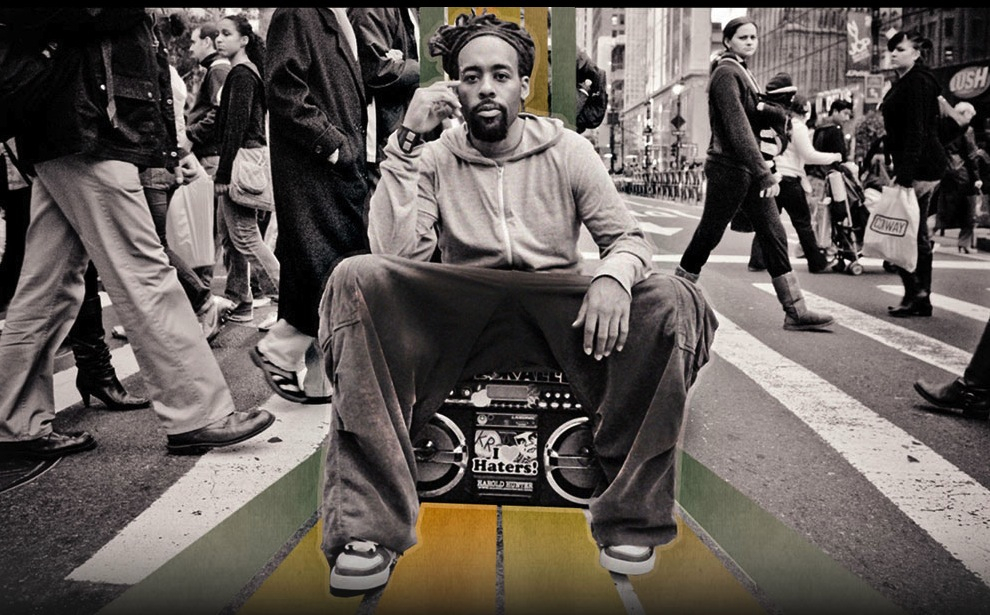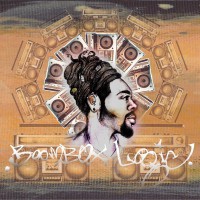
![]() BY MATTHEW HENGEVELD What hip-hop needs are newcomers like Philly’s Kuf Knotz. The man knows his shit, plus he’s got a debut album that absolutely knocks. Boombox Logic is soulful, uplifting and easily the most pleasingly Philly-centric album I’ve heard since the Roots’ 2006 masterpiece Game Theory. Kuf’s not afraid to talk about being a sneaker pimp or have a good time on tracks. His manifesto might as well be “chill, I got this” because he displays a proficiency on the mic that some veterans have yet to achieve. In advance of his appearance tomorrow at the WHYY Connections Festival, we got Kuf on the horn to pick his brain about the hip and the hop and the City Of Brotherly Love.
BY MATTHEW HENGEVELD What hip-hop needs are newcomers like Philly’s Kuf Knotz. The man knows his shit, plus he’s got a debut album that absolutely knocks. Boombox Logic is soulful, uplifting and easily the most pleasingly Philly-centric album I’ve heard since the Roots’ 2006 masterpiece Game Theory. Kuf’s not afraid to talk about being a sneaker pimp or have a good time on tracks. His manifesto might as well be “chill, I got this” because he displays a proficiency on the mic that some veterans have yet to achieve. In advance of his appearance tomorrow at the WHYY Connections Festival, we got Kuf on the horn to pick his brain about the hip and the hop and the City Of Brotherly Love.
PHAWKER: What’s the back story to the name Kuf Knotz (pronounced KOOF NOTZ)
KUF KNOTZ: Well the full name was Kufia, and that was the name that was given to me by a mentor. It means spiritual warrior, it’s West African. So, I just shortened it from Kufia to Kuf, and the Knotz is just a play off my hair.
PHAWKER: What initially inspired you to MC, what was the spark?
KUF KNOTZ: I think growing up being surrounded by music, my grandmother was a gospel singer and my brother was an MC, so I was inspired by that.
PHAWKER: Boombox Logic is very Philly-centered. Are you from here originally, or did Philly pull you in?
KUF KNOTZ: Yeah, Philly kinda pulled me in. I grew up outside of Philly, near Bryn Mawr actually. I went to school in Philly and just stayed there.
PHAWKER: The sound on Boombox Logic, it’s got a classic boom-bap sound, but it’s got plenty of experimentation too. Especially on a track like “Fame Us.” It really pulls on tradition, and you explore that more in “Soul Music.” What role does tradition play in your music, and what way do you test that?
KUF KNOTZ: I like how you said there’s a mix in the album. That was the aim for the album, the Boombox Logic, the boombox being the foundation of hip-hop, where hip-hop started, so I tried to play off that tradition lyrically, and keep it fun and not heavy topic-wise. You still have some consciousness in there and some social awareness — but it’s a fun album. I tried to carry that tradition of hip-hop into the album. But also music-wise I wanted to experiment with it, and keep it in the present and up-to-tune with what’s going on now. So it’s like a marriage between the two.
PHAWKER: It’s got a lot of dubstep, modern stuff, but also a lot of soul and classic sounds. It kind of encompasses all of what Philadelphia has to offer.
 KUF KNOTZ: Yeah, Philly is a very, very soulful place, so I definitely inherited that.
KUF KNOTZ: Yeah, Philly is a very, very soulful place, so I definitely inherited that.
PHAWKER: I heard that you once opened for Bruce Springsteen when he played in Philadelphia. What was that like?
KUF KNOTZ: Ah, that was awesome. That was my best gig to date. It was special, not only just because I was opening for Bruce, but also because it was for Barack. So, you know that was a beautiful day, the energy there was great. Sixty thousand people, and everyone was real positive and open. It was a good day.
PHAWKER: Obama’s really uplifted hip-hop in general. He sparked life, where Bush kinda wore away, and got people down.
KUF KNOTZ: True. True.
PHAWKER: In that vein, what do you think is keeping hip-hop alive, in Philly and beyond?
KUF KNOTZ: Well, in Philly the hip-hop… There’s not a lot of mainstream hip-hop going on in Philly, but there’s a strong, creative pull of MC-ing and hip-hop arts in Philly. And Philly, for one, is very competitive, so everyone works hard to be the best. There is such a high level of talent, and I think that keeps hip-hop alive in one sense. As far as the radio and everything, I think what’s keeping hip-hop alive is that it’s become so commercial in every way. Like, big business uses hip-hop to promote or advertise. So I think that’s keeping that part of hip-hop alive.
PHAWKER: Back in the ‘80s there was that Fruity Pebbles commercial with Fred Flintstone and Barney Rubble rapping. To think that that was the beginning.
KUF KNOTZ: Yeah, exactly. Right?
PHAWKER: So where do you see hip-hop going in the next 10 years and where do you think you will be going in the next 10 years?
KUF KNOTZ: Where’s hip-hop going in the next 10years? I honestly don’t know. Because if you would’ve asked me ten years ago if I thought it’d be here today, I would have said not at all. I know where I’d like to see it go. I’d like to see it become kind of like a marriage, like what I shot to do on Boombox Logic, where the feel of hip-hop, the party vibe and consciousness of it became more relevant, but still be very experimental musically. That would be awesome if it went there. Myself, I’d just like to be able to, 10 years from now, have had my music heard all over the world and be able to travel and hold myself up from just playin’ music. You know?
